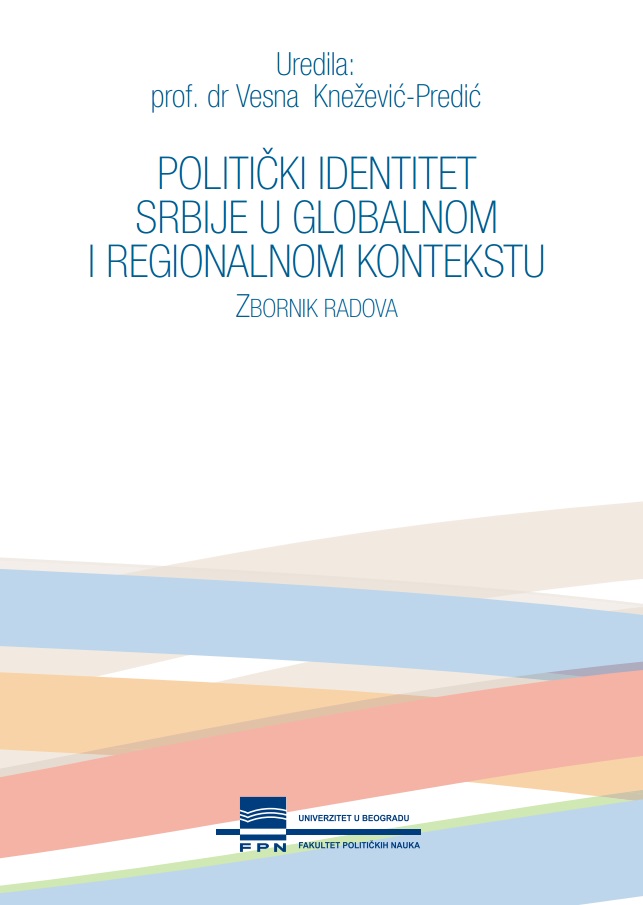
We kindly inform you that, as long as the subject affiliation of our 300.000+ articles is in progress, you might get unsufficient or no results on your third level or second level search. In this case, please broaden your search criteria.


(Serbian and Romanian edition) Uoči popisa stanovništva u Saveznoj republici Jugoslaviji, odnosno u Republici Srbiji, neophodno je detabuizirati tzv. “vlaško pitanje”. Naime, postoji neodrživo nasleđe u tumačenju forme i sadržaja ovoga pitanja. U ovoj brošuri Forum za kulturu Vlaha (na vlaškom: Forumu' pėntru Cultura a Rumâńilor) govori o Vlasima u istočnoj Srbiji, tačnije rečeno između Morave, Dunava i Timoka, kao produktu romanizacije, a ne o nekoj kategoriji “vlaha” koji nemaju takav etnički predznak. Nekih drugih “vlaha” i nema na pomenutom prostoru, sem ako se ne izmisle. Romanizacija kao fenomen započeo je sa rimskim zaposedanjem Ilirika, na istočnoj obali Jadrana, u III veku pre nove ere, a na prostorima gde i danas žive na jezicima nepripadnika tzv. Vlasi, posle 168. godine p.n.e. Tada je nestala antička Makedonija da bi se na jugu Balkanskog poluostrva instaliralo Rimsko carstvo. Ovo carstvo se u prvom veku nove ere proširilo do Dunava, a sa Trajanovim osvajanjima, od 101. do 105. godine nove ere, i preko Dunava. Tako je nastala Trajanova Dakija koja opstaje do 271. godine n.e. Te godine, iz strateških razloga, po odluci imperatora Aurelijana, Rimljani i deo romanizovane populacije napuštaju prostore severno od Dunava, pa se južno od Dunava uspostavlja Aurelijanova Dakija. Ovde se nastavlja proces romanizacije autohtone populacije Tračana, kao i onih koji su iz različitih motiva došli ili su dovedeni sa raznih drugih strana Rimske imperije. Verovatno je taj proces osnažen i promenom u rimskoj legislaciji kroz unifikaciju statusa rimskih građana Ediktom imperatora Karakale 212. godine. Tako su se u jugoistočnoj Evropi rodili “Vlasi”. Zbog intenzivnosti tog procesa na karpatsko-podunavskom prostoru, istorijski gledano ovo šire područje se može označiti prostorom gde su se pojavili “Vlasi”, tj. to je “vlaški matični prostor”. U današnje vreme, imajući u vidu istorijske i antropološko-kulturološke promene koje su se dogodile u proteklih dva milenijuma, tako se može kvalifikovati samo današnja Rumunija. U etnogenetskim procesima, za koje se smatra da su se okončali od VII-X veka, ovaj balkanski element je dobio novo ruho. Njegovom uobličavanju u novi etnički entitet doprinos su dali i Sloveni u svom pomeranju na Balkanskom poluostrvu. U toku ili pri kraju takvog procesa došlo je do razdvajanja severnog i južnog ogranka ove populacije, koja se pod imenom Vlaha pominje u istoriji 976. godine, povodom pogibije Davida, brata cara Samuila. Još iz najranijih vremena Germani su susedne Kelte i Rimljane nazivali WALHOS. Kasnije se ova etnička odrednica suzila na romanizovane populacije koje su dobile svoju latinsku identifikaciju ROMANUS. Od ova dva naziva nastale su hipostaze koje poznajemo i u današnje vreme, uključujući i slovenski naziv “Vlah, Vlasi”, odnosno “vlaški”, na rumunskom književnom jeziku “Român, Români”, na rumunskom narodnom govoru “Rumân, Rumâni” (kao npr. u Dosoftejevom Psaltiru u stihovima na rumunskom iz 1673., te u Šerbanovoj Bibliji na rumunskom iz 1688., itd.), naime na muntenskom, krišanskom, maramureškom, moldavskom i banatskom narečju rumunskog jezika.
More...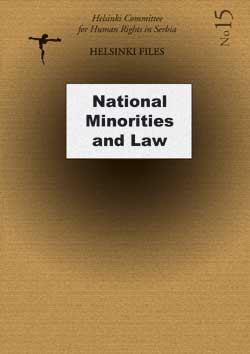
October 2000 political changeover did not produce the fundamental break with Milosevic's policy. There are numerous examples thereof, notably as regards Republika Srpska, Kosovo and Montenegro. Insistence on that orientation in the face of factual defeat had a negative impact on status of inter-ethnic relations in Serbia proper. National policy aiming at creating an ethnically pure Serb state ended with a catastrophic balance: hundreds of thousands of dead, several million displaced persons and refugees. In the past decade minorities, notably Croats (during the war in Croatia), Bosniaks (during the war in B&H) and Albanians (during the whole decade) bore the brunt of "ethnic-cleansing" policy. By extension, relations between the majority people and some minorities were exacerbated. In the meantime minorities have radicalised their stands and are waiting for resolution of their problems by dint of international community brokerage. Most conspicuous example of the aforementioned was South Serbia, in which the danger of conflict spill-over was great for a while. But thanks to NATO and other international organisations actions and efforts tension has eased and cooperation and revival of economy have been initiated owing to enormous political and financial support of the West. Serbia has entered the period of facing up to difficult and long-term consequences of nationalistic and war policy of the former regime. The entire society has been devastated, and institutions of system destroyed. Long wars, international isolation and bombardment campaign have impacted the general social mood, which is marked by high intolerance, xenophobia, anti-Semitism and emergence of neo-Nazi groups. This is all due to the political vacuum and absence of vision of Serbia's future. Such a general atmosphere affects national minorities, who feel increasingly threatened. The last census, according to unofficial information, indicates that Serbia remains a markedly multi-ethnic country. This may be explained by massive emigration or brain-drain of young and educated Serbs. About 400,000 refugees from Croatia, Bosnia and Kosovo, contrary to some expectations, have not to a larger extent changed the demographic structure of the country. Despite emigration of minorities, their percentage remained the same, in view of de-assimilation of Vlahs and Romany (they stopped identifying with Serbs). This means that the minority issue would remain the hot issue, notably if the nationalistic block continues to persist on realisation of ethnically pure state. Some ethnic communities have been territorially homogenised, hence some of them, in some areas constitute the majority population. Some national minorities, notably Albanians, Bulgarians, Croats, Hungarians, Bosniaks/Muslims, and Romanians inhabit border areas. Thus their territorial homogenisation is a complex political fact. Despite current authorities efforts to fine-tune national minorities-related domestic legislation to the European standards, situation in that regard is slowly changing because of badly impaired inter-ethnic relations in the last decade. Ethnic distance had been increased, but as of late it started dwindling, but not everywhere and not with respect to all minorities.
More...
Wiktor Woroszylski followed a path characteristic for many Polish intellectuals in the second half of the 20th century: from entanglement in communism to active opposition to it. He was not only a witness but also a participant of many events of key significance for the post-war history who also influenced them.It is a chronicle of a non-conformist group, written down at a time when keeping such records required great courage, and, at the same time, an expressive portrait of that group, strengthened internally by friendship and mutual loyalty, which has finally become a timeless example of freedom.Crowds, people released from jail, the whole group, one can hardly work out, probably more than one hundred people, press, talks about what has happened, and euphoria again. I was not imaginative enough to realize what happened; I treated the whole work of the Workers’ Defence Committee, etc., in the past years more as a way to save our souls and perhaps create some islands of internal freedom but I did not take into account the prospects of social victory on such a scale.
More...
Three months which changed Ukraine written down through the testimonies of individuals: recordings, diaries, memoirs, blogs or Facebook entries. The multitude of experiences makes up a universal story of the phenomenon of Ukrainian breakthrough which started with a peaceful rally in defence of pro-European orientation of the country and ended with the revolution in Kiev and the overthrow of a criminal president. It was the time when the Ukrainians started speaking with a full voice about their right to free choice, about honesty, truth, and dignity, and finally took to the streets in their defence at any cost.
More...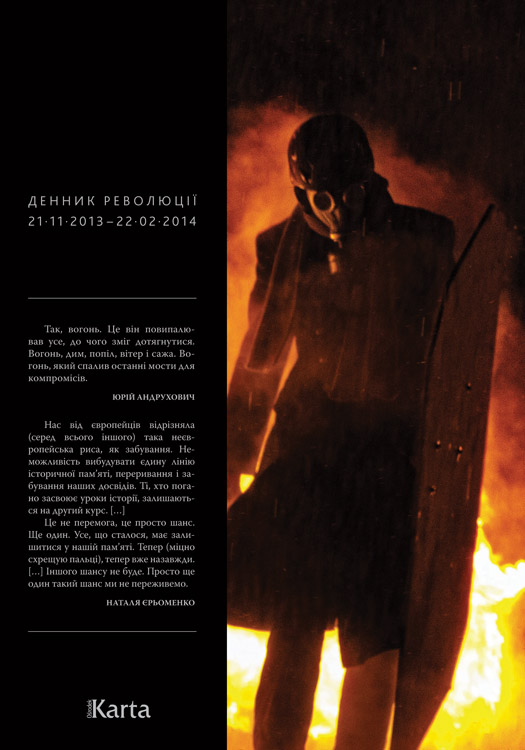
Three months which changed Ukraine written down through the testimonies of individuals: recordings, diaries, memoirs, blogs or Facebook entries. The multitude of experiences makes up a universal story of the phenomenon of Ukrainian breakthrough which started with a peaceful rally in defence of pro-European orientation of the country and ended with the revolution in Kiev and the overthrow of a criminal president. It was the time when the Ukrainians started speaking with a full voice about their right to free choice, about honesty, truth, and dignity, and finally took to the streets in their defence at any cost.
More...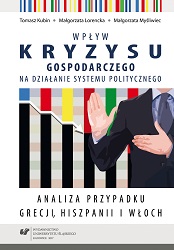
The main scientific goal of the following study is to show the impact of an economic crisis on the functioning of a political system. The object of detailed research studies was the political systems of Greece, Spain and Italy. It was in these European Union countries that the effects of the worldwide economic crisis seemed to have had the biggest influence on the workings of the constituent elements of the political system.The leading research hypothesis is that, under the conditions of representative democracy,the economic situation of a state is one of the major determinants of the stability and continuity of its political system. The better the economic condition of a state, the bigger its political system’s functional stability and ability to endure. On the other hand, under the conditions of a political crisis, this stability and continuity are seriously compromised.The analysis of the impact of the economic crisis on the functioning of political systems ledthe authors to the formulation of the following detailed hypotheses:The operations of political decision-making centres in Greece, Spain and Italy pertainingto economic issues — both on the central and local level — caused serious disruptions to thefunctioning of their political systems.1. The economic crisis in Greece, Spain and Italy caused considerable disruption to the rhythm of election cycles.2. The economic crisis in Greece, Spain and Italy affected the functioning of the party systems in these countries.3. The economic crisis in Spain and Italy considerably influenced an intensification of decentralizing tendencies in these countries.4. The economic crisis in Greece, Spain and Italy influenced an intensification of the process of formulating anti-system postulates by certain political groups.In the introduction, the subject related and methodological assumptions of the conductedresearch were put forward. Chapter one contains an analysis of problems related to the origins,course and consequences of the economic crisis of 2008. The next three chapters contain ananalysis of the consequences of this crisis for the functioning of the political systems of Greece, Spain and Italy. The closing chapter contains general conclusions resulting from the conducted research process.
More...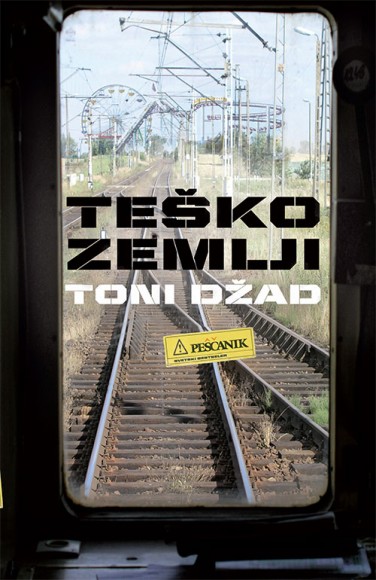
Something is profoundly wrong with the way we think about how we should live today.In Ill Fares The Land, Tony Judt, one of our leading historians and thinkers, reveals how we have arrived at our present dangerously confused moment. Judt masterfully crystallizes what we've all been feeling into a way to think our way into, and thus out of, our great collective dis-ease about the current state of things.As the economic collapse of 2008 made clear, the social contract that defined postwar life in Europe and America“ the guarantee of a basal level of security, stability and fairness -- is no longer guaranteed; in fact, it’s no longer part of the common discourse. Judt offers the language we need to address our common needs, rejecting the nihilistic individualism of the far right and the debunked socialism of the past. To find a way forward, we must look to our not so distant past and to social democracy in action: to re-enshrining fairness over mere efficiency.Distinctly absent from our national dialogue, social democrats believe that the state can play an enhanced role in our lives without threatening our liberties. Instead of placing blind faith in the market—as we have to our detriment for the past thirty years social democrats entrust their fellow citizens and the state itself.Ill Fares the Land challenges us to confront our societal ills and to shoulder responsibility for the world we live in. For hope remains. In reintroducing alternatives to the status quo, Judt reinvigorates our political conversation, providing the tools necessary to imagine a new form of governance, a new way of life.
More...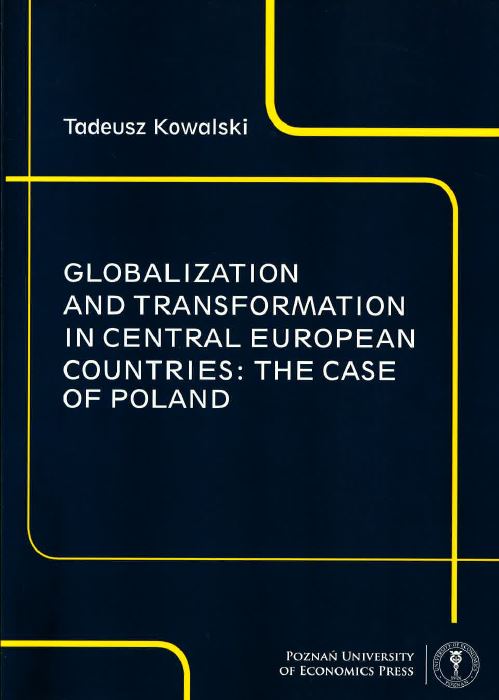
The aim of the book is present and assess the relationship of globalization and market transformation of Poland at the background of development of selected CE and SE countries. The first Chapter identifies and assesses the interplay between liberalization and the course of events in the contemporary globalization stage. The second Chapter is devoted to post WWII economic policy. It shows the economic policy experience and theory available for CECs both at the outset of their market transformation and intellectual climate preceding the economic and financial events that erupted in 2007-2008. The third Chapter reviews and assesses literature on financial crises. On the one hand they stemmed from human errors, on the other their pace of development and scope of contagion they caused should be seen as negative externalities of globalization. Both crises, but in particular the global financial crisis that began in the US in 2007 had harmful consequences for CECs. Following the first three Chapters the aim of the fourth Chapter is an empirical evaluation and comparison of Poland’s economic performance during market transformation against the background of results achieved in the same period, on the one hand by Hungary, the Czech and Slovak Republics and Ukraine, and on the other by SECs. The fifth Chapter, linked with the fourth is devoted to the major institutional aspect of economic transformation: privatization in Poland. The aim of the sixth Chapter is twofold. The first is to empirically assess the macroeconomic performance of the Polish consecutive democratic accountability terms against the background of economic results achieved in CECs and SECs in 1990-2012. The second aim, referring to findings of Chapter three, is empirical evaluation and comparison of economic performance of Poland and CECs and SECs during the Asian and global financial crises.
More...
Uniwersalna koncepcja marketingu znajduje zastosowanie nieomal w każdej dziedzinie życia gospodarczego i społecznego. Czerpanie z zasobów wiedzy marketingowej stało się faktem i jednocześnie koniecznością również w przypadku terytoriów. Wyodrębniony w ten sposób marketing terytorialny przybiera w praktyce różne formy: od aplikacji najprostszych narzędzi promocji po skomplikowany proces kreowania marki terytorium. Ich skuteczne i efektywne wykorzystanie do osiągania celów terytoriów wymaga jednak solidnych podstaw teoretycznych i kompleksowego ujęcia. Podręcznik przedstawia, systematyzuje i jednocześnie poszerza podstawową wiedzę z zakresu marketingu terytorialnego, objaśniając pojęcia, zależności, metody, techniki i uwarunkowania z nim związane.
More...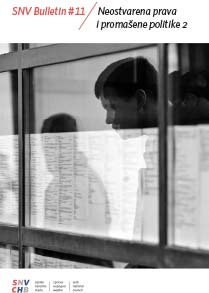
Relying on the fact of by law guaranteed right on proportional representation of national minorities members in public authorities that has for years presented a big problem and challenge for the Republic of Croatia, Serb National Council (SNC) published the analysis Unrealized Rights and Failed Policies: Representation of National Minorities in State Administration, Judiciary and Police in March of 2014. The analysis was based on competent authorities’ data about the representation of national minorities in stated institutions, highlighting the representation of Serbs followed and collected by SNC and the Independent Democratic Serbian Party Club in the Croatian Parliament between the middle of 2008 and the middle of 2013, respectively until the beginning of the EU membership of Republic of Croatia in July of 2013. The results of the analysis were devastating. It has been noticed that during the analysed period, despite the specific measures of the Government of Republic of Croatia, not only there was no improvement in realization of the rights, but previously achieved level of representation demonstrate tendencies of moderate to significant degradation. Former politics of the Government directed towards increasing the number of national minorities’ members in competent authorities have been rated as useless, and stated reasonable doubt they were only fulfilling the form in order to meet the criteria of the EU entry negotiations. The conclusion, among other, stated the necessity for the Government and other competent authorities to undertake decisive, comprehensive and concrete measures in collaboration and with participation of national minorities’ representatives and independent experts in the following period in order to implement the corresponding guaranteed rights.
More...
The year behind us was marked by an increased number of physical assaults on Serbs in Croatia, threats against them and destruction of their property. In 2015 Cyrillic script1 in Vukovar was practically abolished and we have witnessed numerous attempts to rehabilitate the Independent State of Croatia (NDH)2 as well as an increased incidence of hate speech by public figures and part of the media. For this reason 2015 will be remembered as the year in which nationalist and anti-minority atmosphere – which became more intense since Croatia’s accession to the European Union in 2013 – has reached a worrying scale.
More...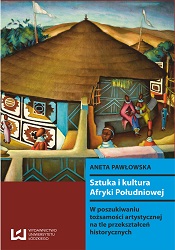
The study Art and Culture of South Africa. In search of artistic identity of South Africa, as influenced by historical transformations – was conceived and written thanks to a study-stay of its author in Johannesburg, South Africa during a four year period between 2001 and 2004.
More...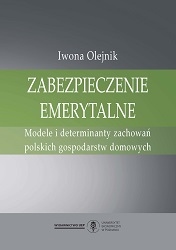
The problem of securing the material needs of individuals who due to their advanced age have a limited opportunity to acquire incomes which would allow them to satisfy these needs is a valid and vital one. Nowadays, almost in all developed countries, the number of people who have finished or will soon finish their professional career due to their advanced age is growing. For this reason, state pensions systems become increasingly financially inefficient. This inefficiency determines the necessity to introduce changes in the structure of the incomes acquired when retired – decreasing the dominance of the benefits received from the state institutions and increasing the share of funds coming from private financing. It is difficult to precisely determine what part of pensions provision should be fulfilled by individual voluntary savings and other methods of providing for old age. It is beyond doubt that too low savings may result in the deterioration of the quality of life when retired (if old age pensions received from the state system also prove insufficient). It is anticipated that a considerable percentage of the employed population does not or will not be in possession of sufficient savings – acquired both from the public system and set aside individually – to provide for retirement. Moreover, economic and social changes, particularly those occurring in the labour market, the improvement of the quality of life, economic emigration, but also the changes occurring in the models of family and legal regulations in the pension systems contribute to the changes in the attitudes and behaviour of households as regards to their choices. The above mentioned monograph focuses on the behaviour of households with regard to providing for their members' future retirement. The main subject is the behaviour of households in the period of accumulation of pension capital, i.e. in the first stage of the so-called risk of ageing. This stage finishes with reaching the retirement age, which is connected with losing one's incomes achieved so far from performed work. Minimizing this loss requires transferring a part of one's consumption from the period of being professionally active (by means of accumulating savings) to the period of old age in the future. The extensive knowledge about the behaviour of various groups may enable better social policy actions and creating pension products tailored to the needs of households. Therefore, the main aim of the paper was to build a model of attitudes and behaviour of households regarding financial security when retired. Taking into consideration the multifaceted nature of the research issues, an attempt was made at creating a whole model of the attitudes of households towards providing for old age. The construction of the model of the attitudes of households towards providing for old age was possible thanks to using the exploratory and confirmatory factor analysis. This model consists of 4 constructs: the belief that additional pension provision is necessary, knowledge, securing one's family and expectation towards life when retired.
More...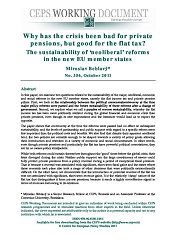
In this paper, we examine two questions related to the sustainability of the major, neoliberal, economic and social reforms in the new EU member states, namely the flat income tax and private pension pillars. First, we look at the relationship between the political consensus/controversy at the time major policy reforms were passed and the future sustainability of these reforms after a change of government. Second, we explore what we call a paradox of reverse sustainability, where by the flat income tax has been more politically resilient during the global financial and economic crisis than private pensions, even though ex ante expectations and the literature would lead us to expect the opposite. The paper shows that controversy at the time the reforms were passed had no effect on subsequent sustainability, and the levels of partisanship and public support with regard to a specific reform seemless important than the political costs and benefits. We also find that despite their apparent neoliberalbent, the two policies are versatile enough to be shaped towards a variety of policy goals, allowing their introduction and retention in a variety of economic and social circumstances. In other words, even though private pensions and particularly the flat tax have powerful political connotations, they are by no means policy strait jackets.
More...
Der vorliegende Band analysiert Umstände und Folgen der kroatischen Arbeitsmigration nach Westdeutschland in den 60er und 70er Jahren des 20. Jahrhunderts. Bekannt unter dem Begriff Gastarbeitermigration wurde diese Wanderung in der ersten Zeit als vorläufige Beschäftigung der vornehmlich jüngeren männlichen Population mit niedriger Berufsqualifikation realisiert, in der Folge entwickelte sie sich aber zu einem längerfristigen Verbleib sowie Nachzug ganzer Familien nach Deutschland. Das Buch enthält Kapitel über Migranten und ihre Nachkommen, die sogenannte transnationale Generation in Deutschland. Die Grundlage für das Buch lieferten die mit Kroaten in Deutschland geführten Gespräche in der Zeitspanne von 2002 bis 2017. Dabei werden Schlüsselthemen und Metaphern erörtert, die aus dem Leben der Kroaten im Aufnahmeland (damaliges Westdeutschland) und dem Herkunftsland (damaliges Jugoslawien, heute Kroatien und Bosnien und Herzegowina) entspringen, aber auch jene, die sich aus dem transnationalen sozialen, jenseits der staatlichen Grenzen geschaffenen Raum herleiten.
More...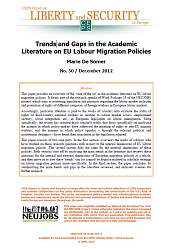
This paper provides an overview of the ‘state of the art’ in the academic literature on EU labour migration policies. It forms part of the research agenda of Work Package 18 of the NEUJOBS project, which aims at reviewing legislation and practices regarding the labour market inclusionand protection of rights of different categories of foreign workers in European labour markets. Accordingly, particular attention is paid to the works of scholars who evaluate the status of rights of third-country national workers in relation to labour market access, employment security, social integration, etc., in European legislation on labour immigration. More specifically, the review has selected those scholarly works that focus specifically on analysingthe manner in which policy-makers have addressed the granting of rights to non-EU migrant workers, and the manner in which policy agendas – through the relevant political and institutional dynamics – have found their translation in the legislation adopted.
More...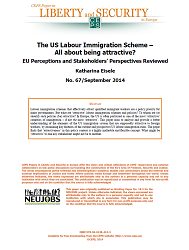
Labour immigration schemes that effectively attract qualified immigrant workers are a policy priority for many governments. But what are ‘attractive’ labour immigration schemes and policies? To whom are (or should) such policies (be) attractive? In Europe, the US is often portrayed as one of the most ‘attractive’ countries of immigration – if not the most ‘attractive’. This paper aims to analyse and provide a better understanding of the elements of the US immigration system that are supposedly attractive to foreign workers, by examining key features of the current and prospective US labour immigration rules. The paper finds that ‘attractiveness’ in this policy context is a highly malleable and flexible concept: What might be ‘attractive’ to one key stakeholder might not be to another.
More...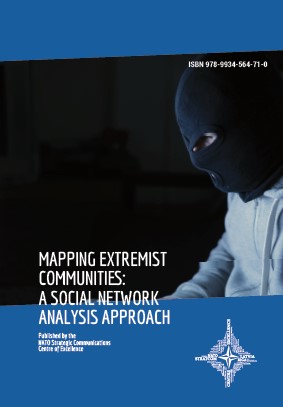
Online social networks are used by everyone in our everyday lives, including by malicious actors and organisations. Previous work has characterised the specific online behaviour of Middle East-based terror groups. However, this behaviour is constantly evolving, as a response to events such as the battle of Mosul and also due to the strengthening of the platforms’ moderation rules. Terror groups target social media platforms such as Twitter, Telegram, and Discord, and while their past behavioural patterns and narrative strategies have been well documented, the adaptive nature of these groups require continuous analysis of their online presence.
More...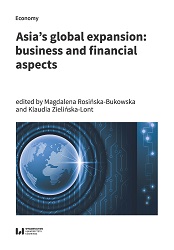
The concept of this monograph is focused on an analysis of the prospects for improving the competitive position of Asian countries in the global economy. The authors argue that a comprehensive analysis of Asia’s economic development requires studying its business and financial aspects in parallel. The authors of the monography concentrate on the chosen business aspects of Asia’s expansion, such as: trade and value chain development, Asian transnational corporations, international mergers and acquisitions, growth potential of energy industry, GDP growth model.The unique nature of the studies conducted for this book stems from their wide thematic and geographical scope. Consequently, both business and financial features of economic growth are analysed. This approach is further used to study the financial aspects of China’s development in a related book prepared by the authors from the same Department: China’s economic growth: selected financial aspects.According to the opinion expressed by the reviewer the following monograph constitutes a valuable contribution to the discussion concerning the new role of Asian economies in the world. It is recommended to scientists, students and journalist who study the problems of Asia’s economic development and its role in the global economy. The results can be also useful to companies interested in developing their business activities in the countries of the region.
More...